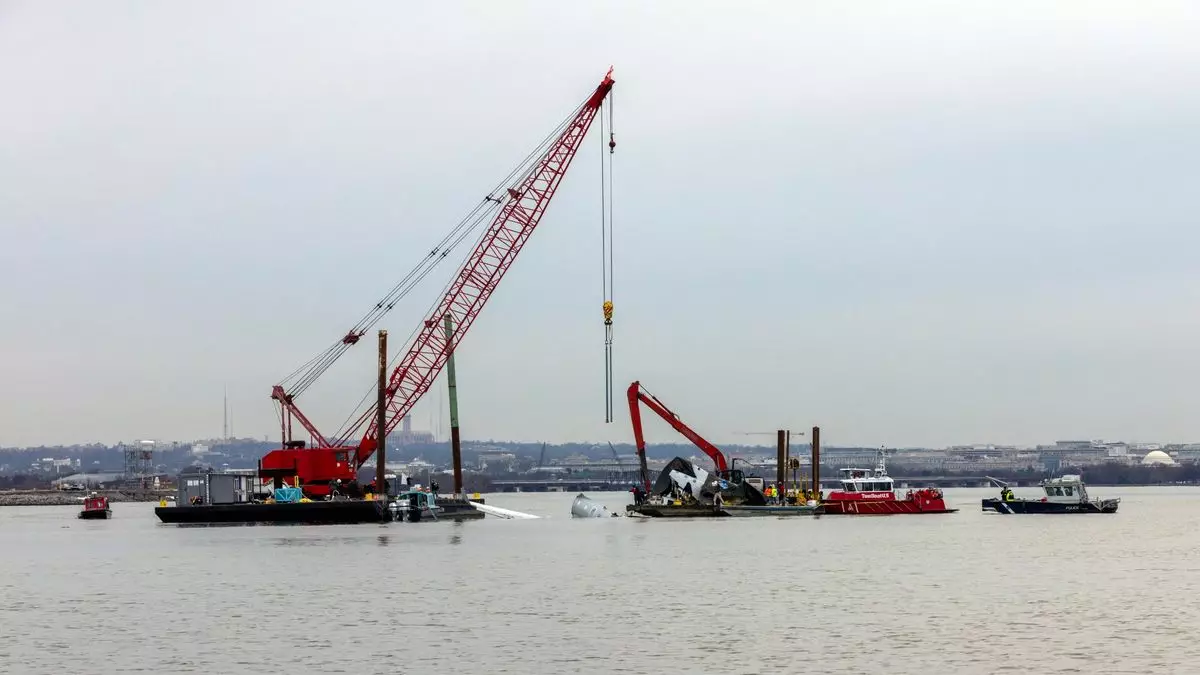The National Transportation Safety Board (NTSB), often hailed as the premier authority on air accident investigations, finds itself in a precarious position following President Trump’s controversial remarks about the cause of a tragic crash involving an American Airlines regional jet and an Army Black Hawk helicopter. This incident, which occurred on January 29 and tragically resulted in the loss of 67 lives, has ignited a debate on the intersection of politics and safety investigations, raising concerns among experts about the potential ramifications of political pressure on an institution historically regarded for its autonomy and expertise.
In the aftermath of the January 29 collision, President Trump speculated publicly that diversity, equity, and inclusion (DEI) policies might have contributed to the accident. He argued that air traffic controllers should be “naturally talented geniuses” rather than regular individuals, asserting that he had no direct evidence but was justified in making these claims based on “common sense.” This preemptive commentary from the highest office in the land has drawn criticism from political analysts and aviation safety experts alike. They argue that such statements could unintentionally exert pressure on the NTSB during its investigation, sparking fears of politicization. Mark Jones, a political science professor at Rice University, expressed concern that this interference complicates the NTSB’s work and undermines its credibility.
The implications of a president speculating on the causes of an ongoing investigation are profound. By insinuating a connection between DEI practices and air traffic safety, Trump potentially shifts the focus of the NTSB, diverting attention from an unbiased examination of the accident to a politically charged debate. Such a dynamic raises crucial questions: To what extent should political figures involve themselves in technical investigations? What happens when the findings clash with the pronouncements of a sitting president?
The NTSB, structured with a bipartisan board of directors appointed by the president, has historically operated with a significant degree of independence. This independence allows them to conduct thorough, fact-based investigations devoid of external influences. However, the recent comments from Trump have disrupted this autonomy, raising concerns about possible repercussions for the agency if its findings contradict his statements. David Clark, a political science professor at Vanderbilt University, highlighted this precarious situation by questioning whether the NTSB’s budget could come under scrutiny should their final report differ from the president’s claims.
The relationship between presidential influence and agency performance is complicated; political support can be a double-edged sword. Funding independence from the White House does not necessarily shield the NTSB from congressional allies of the president, who may take cues from Trump’s statements. The potential for congressional dynamics to shift in response to investigations perceived as unfavorable to the administration presents a significant challenge and evokes fears of politically motivated consequences.
Despite the turmoil created by Trump’s remarks, NTSB officials have reaffirmed their commitment to a diligent investigation process. Leaders have publicly declared that the agency will adhere strictly to the facts, with J. Todd Inman, board member, emphasizing their dedication to determining what truly transpired. Nonetheless, the immediate aftermath of Trump’s comments prompted a defensive response from NTSB Chair Jennifer Homendy, who noted that early speculation often leads the media to draw premature conclusions about causation.
Former NTSB officials have not shied away from expressing their discontent with the politicization of air safety investigations. Peter Goelz, a former managing director, labeled Trump’s comments as “appalling,” arguing that the integrity of an agency known for rigorous, unbiased investigations is paramount. With decades of established protocols that promote an apolitical approach to safety investigations, the introduction of political rhetoric threatens not only the investigative process but also public trust in the outcomes.
As the NTSB navigates these political waters, it faces a pivotal moment that could redefine the balance between independent investigation and political influence. The fundamental principles that have guided the agency for decades are at stake, with implications that extend beyond mere transportation safety. If political discourse continues to encroach upon technical investigations, it may set a precedent that emboldens future leaders to intervene in matters where political interests may not align with expert judgment.
The call for preserving the NTSB’s independence is urgent. The agency’s ability to conduct impartial investigations hinges on its insulation from political pressures, ensuring that safety remains the paramount concern, devoid of external biases. The future of air safety investigations rests on the commitment of all stakeholders to uphold these principles, safeguarding a legacy that has earned the NTSB its reputation as the gold standard in aviation safety.


Leave a Reply